初中英语语法—连词
图片预览

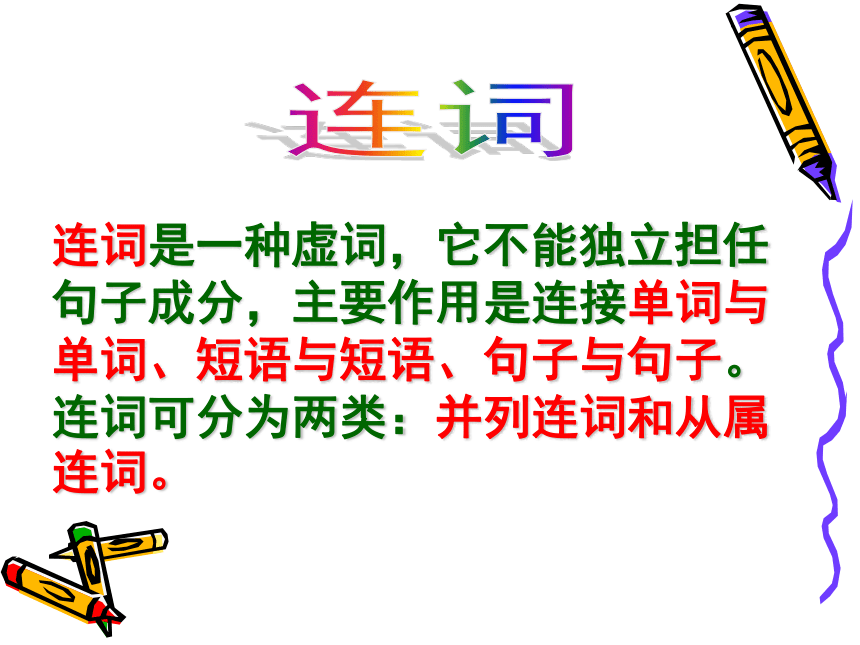
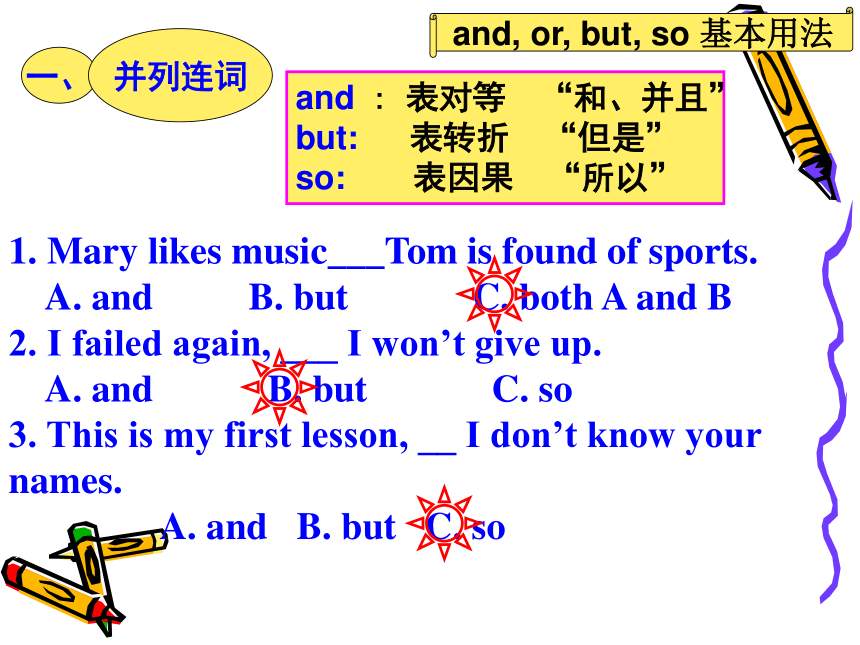
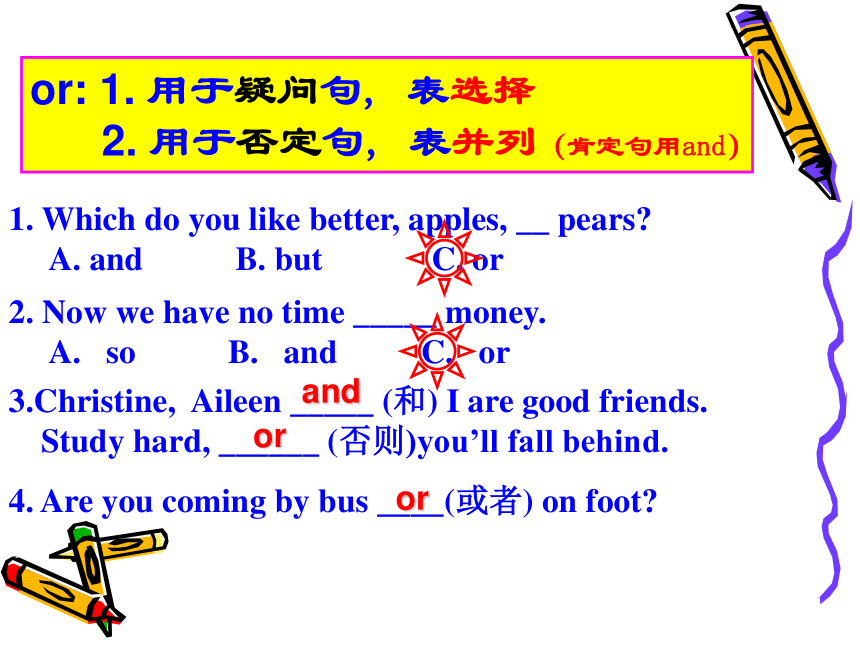
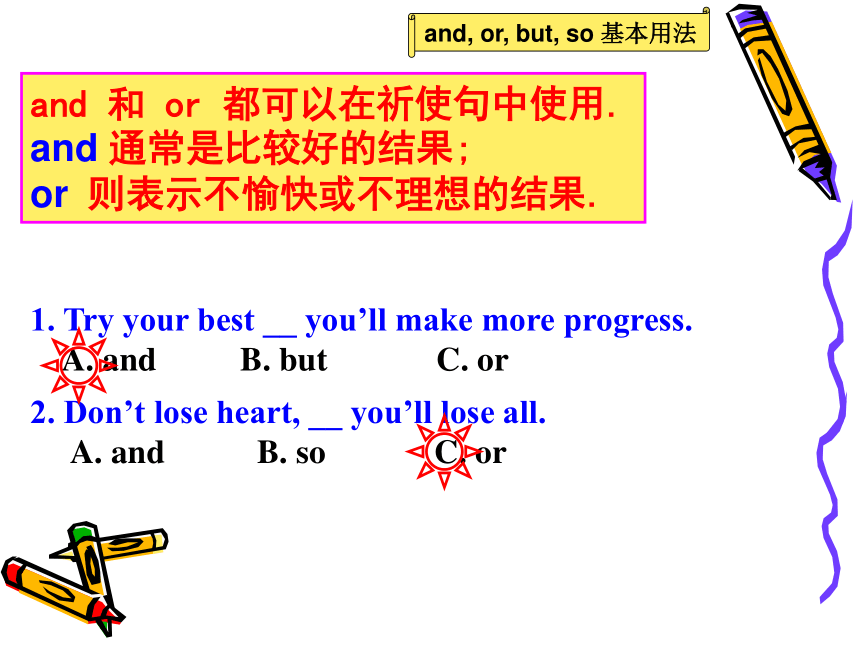
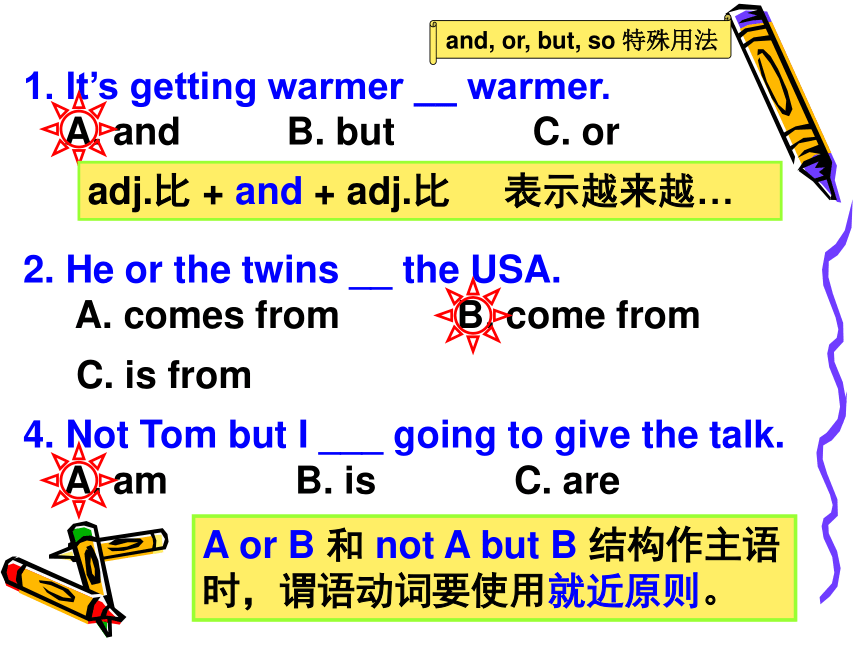
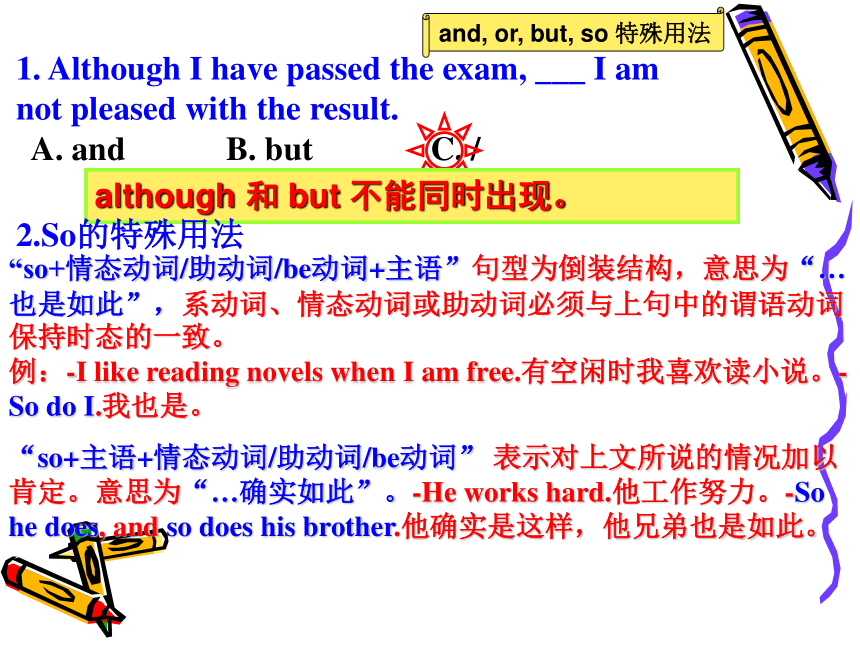
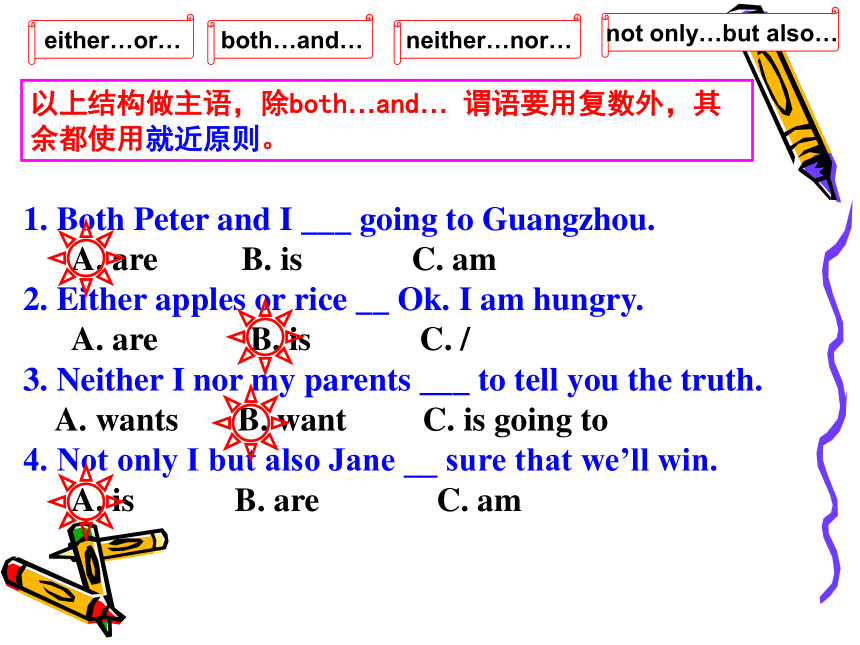
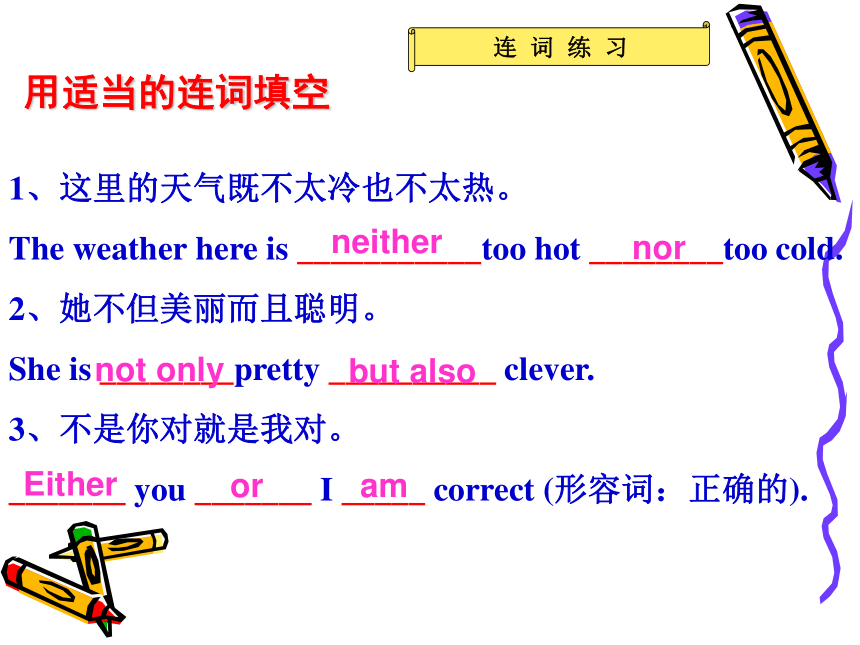
文档简介
(共26张PPT)
稻田一中 李培军
连词是一种虚词,它不能独立担任句子成分,主要作用是连接单词与单词、短语与短语、句子与句子。连词可分为两类:并列连词和从属连词。
一、
并列连词
1. Mary likes music___Tom is found of sports.
A. and B. but C. both A and B
2. I failed again, ___ I won’t give up.
A. and B. but C. so
3. This is my first lesson, __ I don’t know your names.
A. and B. but C. so
and : 表对等 “和、并且”
but: 表转折 “但是”
so: 表因果 “所以”
and, or, but, so 基本用法
1. Which do you like better, apples, __ pears
A. and B. but C. or
2. Now we have no time _____ money.
A. so B. and C. or?
or: 1. 用于疑问句, 表选择
2. 用于否定句, 表并列(肯定句用and)
3.Christine, Aileen _____ (和) I are good friends. Study hard, ______ (否则)you’ll fall behind.
4. Are you coming by bus ____(或者) on foot
and
or
or
1. Try your best __ you’ll make more progress.
A. and B. but C. or
2. Don’t lose heart, __ you’ll lose all.
A. and B. so C. or
and 和 or 都可以在祈使句中使用.
and 通常是比较好的结果;
or 则表示不愉快或不理想的结果.
and, or, but, so 基本用法
1. It’s getting warmer __ warmer.
A. and B. but C. or
2. He or the twins __ the USA.
A. comes from B. come from
C. is from
4. Not Tom but I ___ going to give the talk.
A. am B. is C. are
adj.比 + and + adj.比 表示越来越…
A or B 和 not A but B 结构作主语时,谓语动词要使用就近原则。
and, or, but, so 特殊用法
1. Although I have passed the exam, ___ I am not pleased with the result.
A. and B. but C. /
and, or, but, so 特殊用法
although 和 but 不能同时出现。
“so+情态动词/助动词/be动词+主语”句型为倒装结构,意思为“…也是如此”,系动词、情态动词或助动词必须与上句中的谓语动词保持时态的一致。 例:-I like reading novels when I am free.有空闲时我喜欢读小说。-So do I.我也是。
“so+主语+情态动词/助动词/be动词” 表示对上文所说的情况加以肯定。意思为“…确实如此”。-He works hard.他工作努力。-So he does, and so does his brother.他确实是这样,他兄弟也是如此。
2.So的特殊用法
1. Both Peter and I ___ going to Guangzhou.
A. are B. is C. am
2. Either apples or rice __ Ok. I am hungry.
A. are B. is C. /
3. Neither I nor my parents ___ to tell you the truth.
A. wants B. want C. is going to
4. Not only I but also Jane __ sure that we’ll win.
A. is B. are C. am
both…and…
either…or…
neither…nor…
not only…but also…
以上结构做主语,除both…and… 谓语要用复数外,其余都使用就近原则。
1、这里的天气既不太冷也不太热。
The weather here is ___________too hot ________too cold.
2、她不但美丽而且聪明。
She is ________pretty __________ clever.
3、不是你对就是我对。
_______ you _______ I _____ correct (形容词:正确的).
neither
nor
not only
but also
Either
or
am
用适当的连词填空
连 词 练 习
连接条件状语从句:
1、You’ll be late _____(如果) you don’t get up early tomorrow.
2、I’ll come to see you _______(如果) I’m free next Saturday.
3、We’ll have a picnic tomorrow _______(如果) it doesn’t rain tomorrow.
* 注意状语从句的时态:“主将从现”。
if
if
if
连 词 练 习
连接时间状语从句
I was cleaning the floor _____(当…的时候) she knocked at the door.
Dick climbed up into a tree _________________(一…就) he saw the bear.
I knew nothing about it _____(直到…才) my friend told me yesterday.
I haven’t heard from Bill ______(自从) we graduated from middle school.
when
as soon as
until
since
连接原因、结果状语从句
You should return the digital camera to Sally _____ she will not be angry.
A. so that B. because C. before
2. He was hurt ____ badly _____ he had to see a doctor.
A. too…to B. so… that C. so that
3.He took off his coat ______ it was too hot in the room. A.And B. since C. but
4. Solo missed the bus ____ he was late for school.
A. because B. so C. or
连接让步状语从句
Tom is still doing his homework ___ it is very late. A. so that B. even though C. if
2. I never seem to put on any weight,____ hard I try.
A. though B. no matter how
3. I enjoy learning English, __ it takes me a lot of time. A. unless B. although C. because
4. I will never give up learning English ___________
(即使) it is difficult.
even though
1) 如果原因构成句子的最主要部分,一般用because。因此,because引导的从句往往放在句末。例如:
I stayed at home because it rained.
---Why aren’t you going ---Because I don’t want to.
2) 如果原因已被人们所知,或不如句子的其它部分重要,就用as或since。since比as稍微正式一点。as和since 引导的从句一般放在句子的开头。例如:
As he wasn’t ready, we left without him.
Since I have no money, I can’t buy any food.
3) for用来补充说明一种理由,因此,for引导的从句几乎可以放在括号里。for引导的句子不放在句子的开头。例如:
I decided to stop and have lunch,for I was feeling quite hungry.
as, because, since , for
连 词 用 法 比 较
三者均可译为“在……时候”。when引导的从句,动词既可以是延续性的,也可以是终止性的。一般来说,当主句的动作正在进行时,when引导的从句的动作才发生;while引导的从句中,动词只能是延续性的,一般来说,当while引导的从句的动作正在进行时,主句的动作才发生;
若主从句动作同时发生,且强调“一边一边”这样的意思,一般用 as。
When I came into the room, I found him lying there asleep.
She sang as she walked. 她一边走一边唱歌。
注意:
while 可以表示对比关系“然而”。
He is short while his brother is tall.
when,while,as
连 词 用 法 比 较
if和whether都可作“是否”讲,在引导宾语从句是一般可互换。例如:
I wonder whether (if) you still study in that school.
在下列情况下,只能用whether,不能用if:
①.在不定式前。例如:
I haven’t made up my mind whether to go there or not.
②.用or并列两项以上时。例如:I don’t now whether he comes or not.
③.从句作介词宾语时只用whether不用if。
It depends on whether it will be fine.那得看是不是晴天。
④.作discuss等动词的宾语时,用whether不用if。
We discussed whether we should close the shop.我们讨论是不是该关掉商店
if, whether
连 词 用 法 比 较
1) so…that中的so是个副词,其后只能跟形容词或副词,而such...that中的such是个形容词,后接名词或名词短语。例如:
I’m so tired that I can’t walk any farther.
It was such a warm day that he went swimming.
2) 如果在名词之前有many, much, little, few时,用so,不用such。例如:
He has so little education that he is unable to get a job.
so…that, such...that
连 词 用 法 比 较
1. I’ll tell your father the truth as soon as he ___ here.
A. arrives B. arrived C. arrives at
2. We don’t know if he ___ us for the picnic. I’ll call you if he ____.
A. joins; comes B. will join; comes
C. will join; will come
3. Nobody knows when the windows ___. But I’ll tell you when I ___ the answer.
A. broke; find out
B. broken; will find out
C. were broken; find out
连 词 用 法 练 习
4. You won’t understand until you ___ him.
A. meet B. meeting C. will meet
5. You will fail in English ___ you work hard.
A. because B. unless C. if
6. Just because we are young, ___ we should work even harder.
A. so B. / C. but
7. It has been seven years since he __ here.
A. left B. leaves C. leave
连 词 用 法 练 习
8. The little boy ___ when I came in.
A. falls down B. fell down
C. was fell down
9. We were reading when the teacher __ in.
A. came B. comes C. is coming
10. He became a doctor when he ____the university.
A. graduated from B. graduate from
C. graduated for
11. Tom works in a hospital ___ Mary works in a company.
A. because B. until C. while
12. While his mother was washing, he ___ his homework.
A. do B. did C. was doing
13. The little boy fell alseep while he __ the music.
A. was listen B. was listening to
C. listened to
表示对比,“然而,而”
while表示“当…的时候”。 两个动词同时发生。必须使用延续性动词。
14. Hurry up, _____ you will miss the train.
A. and B. so C. however D. or
15. The mountain was ___ steep(陡峭的)____ few people in our city reached the top.
A. so…as B. so…that
C. as…as D. too…to
连 词 用 法 练 习
用适当的连词填空
1. ____________________they are brothers, they don’t look like each other at all.
2. The dress was very expensive, ______ I didn’t buy it.
3. ---Do you know _______________ I could pass the exam
---Sorry, I’ve no idea.
4. Mr. Brown knows little Japanese, ______ he can’t understand the instructions on the bottle of the pills.
Although/Though
so
If/whether
so
连 词 用 法 练 习
5. The war was over about a year ago, ______ the American soldiers in Iraq are still having a lot of trouble to deal with.
6. ---Is David at school today
---No. He is at home _______ he has a bad cold.
7. _____ Lily _____ Lucy may go with you because one of them must stay at home.
but
because
Either or
连 词 用 法 练 习
8. Study hard, _____ you are sure to have a good result in the exam.
9. Please have a wash _______ you go to bed.
10. The twins have learned a lot ______ they came to China.
and
before
since
连 词 用 法 练 习
稻田一中 李培军
连词是一种虚词,它不能独立担任句子成分,主要作用是连接单词与单词、短语与短语、句子与句子。连词可分为两类:并列连词和从属连词。
一、
并列连词
1. Mary likes music___Tom is found of sports.
A. and B. but C. both A and B
2. I failed again, ___ I won’t give up.
A. and B. but C. so
3. This is my first lesson, __ I don’t know your names.
A. and B. but C. so
and : 表对等 “和、并且”
but: 表转折 “但是”
so: 表因果 “所以”
and, or, but, so 基本用法
1. Which do you like better, apples, __ pears
A. and B. but C. or
2. Now we have no time _____ money.
A. so B. and C. or?
or: 1. 用于疑问句, 表选择
2. 用于否定句, 表并列(肯定句用and)
3.Christine, Aileen _____ (和) I are good friends. Study hard, ______ (否则)you’ll fall behind.
4. Are you coming by bus ____(或者) on foot
and
or
or
1. Try your best __ you’ll make more progress.
A. and B. but C. or
2. Don’t lose heart, __ you’ll lose all.
A. and B. so C. or
and 和 or 都可以在祈使句中使用.
and 通常是比较好的结果;
or 则表示不愉快或不理想的结果.
and, or, but, so 基本用法
1. It’s getting warmer __ warmer.
A. and B. but C. or
2. He or the twins __ the USA.
A. comes from B. come from
C. is from
4. Not Tom but I ___ going to give the talk.
A. am B. is C. are
adj.比 + and + adj.比 表示越来越…
A or B 和 not A but B 结构作主语时,谓语动词要使用就近原则。
and, or, but, so 特殊用法
1. Although I have passed the exam, ___ I am not pleased with the result.
A. and B. but C. /
and, or, but, so 特殊用法
although 和 but 不能同时出现。
“so+情态动词/助动词/be动词+主语”句型为倒装结构,意思为“…也是如此”,系动词、情态动词或助动词必须与上句中的谓语动词保持时态的一致。 例:-I like reading novels when I am free.有空闲时我喜欢读小说。-So do I.我也是。
“so+主语+情态动词/助动词/be动词” 表示对上文所说的情况加以肯定。意思为“…确实如此”。-He works hard.他工作努力。-So he does, and so does his brother.他确实是这样,他兄弟也是如此。
2.So的特殊用法
1. Both Peter and I ___ going to Guangzhou.
A. are B. is C. am
2. Either apples or rice __ Ok. I am hungry.
A. are B. is C. /
3. Neither I nor my parents ___ to tell you the truth.
A. wants B. want C. is going to
4. Not only I but also Jane __ sure that we’ll win.
A. is B. are C. am
both…and…
either…or…
neither…nor…
not only…but also…
以上结构做主语,除both…and… 谓语要用复数外,其余都使用就近原则。
1、这里的天气既不太冷也不太热。
The weather here is ___________too hot ________too cold.
2、她不但美丽而且聪明。
She is ________pretty __________ clever.
3、不是你对就是我对。
_______ you _______ I _____ correct (形容词:正确的).
neither
nor
not only
but also
Either
or
am
用适当的连词填空
连 词 练 习
连接条件状语从句:
1、You’ll be late _____(如果) you don’t get up early tomorrow.
2、I’ll come to see you _______(如果) I’m free next Saturday.
3、We’ll have a picnic tomorrow _______(如果) it doesn’t rain tomorrow.
* 注意状语从句的时态:“主将从现”。
if
if
if
连 词 练 习
连接时间状语从句
I was cleaning the floor _____(当…的时候) she knocked at the door.
Dick climbed up into a tree _________________(一…就) he saw the bear.
I knew nothing about it _____(直到…才) my friend told me yesterday.
I haven’t heard from Bill ______(自从) we graduated from middle school.
when
as soon as
until
since
连接原因、结果状语从句
You should return the digital camera to Sally _____ she will not be angry.
A. so that B. because C. before
2. He was hurt ____ badly _____ he had to see a doctor.
A. too…to B. so… that C. so that
3.He took off his coat ______ it was too hot in the room. A.And B. since C. but
4. Solo missed the bus ____ he was late for school.
A. because B. so C. or
连接让步状语从句
Tom is still doing his homework ___ it is very late. A. so that B. even though C. if
2. I never seem to put on any weight,____ hard I try.
A. though B. no matter how
3. I enjoy learning English, __ it takes me a lot of time. A. unless B. although C. because
4. I will never give up learning English ___________
(即使) it is difficult.
even though
1) 如果原因构成句子的最主要部分,一般用because。因此,because引导的从句往往放在句末。例如:
I stayed at home because it rained.
---Why aren’t you going ---Because I don’t want to.
2) 如果原因已被人们所知,或不如句子的其它部分重要,就用as或since。since比as稍微正式一点。as和since 引导的从句一般放在句子的开头。例如:
As he wasn’t ready, we left without him.
Since I have no money, I can’t buy any food.
3) for用来补充说明一种理由,因此,for引导的从句几乎可以放在括号里。for引导的句子不放在句子的开头。例如:
I decided to stop and have lunch,for I was feeling quite hungry.
as, because, since , for
连 词 用 法 比 较
三者均可译为“在……时候”。when引导的从句,动词既可以是延续性的,也可以是终止性的。一般来说,当主句的动作正在进行时,when引导的从句的动作才发生;while引导的从句中,动词只能是延续性的,一般来说,当while引导的从句的动作正在进行时,主句的动作才发生;
若主从句动作同时发生,且强调“一边一边”这样的意思,一般用 as。
When I came into the room, I found him lying there asleep.
She sang as she walked. 她一边走一边唱歌。
注意:
while 可以表示对比关系“然而”。
He is short while his brother is tall.
when,while,as
连 词 用 法 比 较
if和whether都可作“是否”讲,在引导宾语从句是一般可互换。例如:
I wonder whether (if) you still study in that school.
在下列情况下,只能用whether,不能用if:
①.在不定式前。例如:
I haven’t made up my mind whether to go there or not.
②.用or并列两项以上时。例如:I don’t now whether he comes or not.
③.从句作介词宾语时只用whether不用if。
It depends on whether it will be fine.那得看是不是晴天。
④.作discuss等动词的宾语时,用whether不用if。
We discussed whether we should close the shop.我们讨论是不是该关掉商店
if, whether
连 词 用 法 比 较
1) so…that中的so是个副词,其后只能跟形容词或副词,而such...that中的such是个形容词,后接名词或名词短语。例如:
I’m so tired that I can’t walk any farther.
It was such a warm day that he went swimming.
2) 如果在名词之前有many, much, little, few时,用so,不用such。例如:
He has so little education that he is unable to get a job.
so…that, such...that
连 词 用 法 比 较
1. I’ll tell your father the truth as soon as he ___ here.
A. arrives B. arrived C. arrives at
2. We don’t know if he ___ us for the picnic. I’ll call you if he ____.
A. joins; comes B. will join; comes
C. will join; will come
3. Nobody knows when the windows ___. But I’ll tell you when I ___ the answer.
A. broke; find out
B. broken; will find out
C. were broken; find out
连 词 用 法 练 习
4. You won’t understand until you ___ him.
A. meet B. meeting C. will meet
5. You will fail in English ___ you work hard.
A. because B. unless C. if
6. Just because we are young, ___ we should work even harder.
A. so B. / C. but
7. It has been seven years since he __ here.
A. left B. leaves C. leave
连 词 用 法 练 习
8. The little boy ___ when I came in.
A. falls down B. fell down
C. was fell down
9. We were reading when the teacher __ in.
A. came B. comes C. is coming
10. He became a doctor when he ____the university.
A. graduated from B. graduate from
C. graduated for
11. Tom works in a hospital ___ Mary works in a company.
A. because B. until C. while
12. While his mother was washing, he ___ his homework.
A. do B. did C. was doing
13. The little boy fell alseep while he __ the music.
A. was listen B. was listening to
C. listened to
表示对比,“然而,而”
while表示“当…的时候”。 两个动词同时发生。必须使用延续性动词。
14. Hurry up, _____ you will miss the train.
A. and B. so C. however D. or
15. The mountain was ___ steep(陡峭的)____ few people in our city reached the top.
A. so…as B. so…that
C. as…as D. too…to
连 词 用 法 练 习
用适当的连词填空
1. ____________________they are brothers, they don’t look like each other at all.
2. The dress was very expensive, ______ I didn’t buy it.
3. ---Do you know _______________ I could pass the exam
---Sorry, I’ve no idea.
4. Mr. Brown knows little Japanese, ______ he can’t understand the instructions on the bottle of the pills.
Although/Though
so
If/whether
so
连 词 用 法 练 习
5. The war was over about a year ago, ______ the American soldiers in Iraq are still having a lot of trouble to deal with.
6. ---Is David at school today
---No. He is at home _______ he has a bad cold.
7. _____ Lily _____ Lucy may go with you because one of them must stay at home.
but
because
Either or
连 词 用 法 练 习
8. Study hard, _____ you are sure to have a good result in the exam.
9. Please have a wash _______ you go to bed.
10. The twins have learned a lot ______ they came to China.
and
before
since
连 词 用 法 练 习
同课章节目录
- 词法
- 名词
- 动词和动词短语
- 动词语态
- 动词时态
- 助动词和情态动词
- 非谓语动词
- 冠词
- 代词
- 数词和量词
- 形容词副词及其比较等级
- 介词和介词短语
- 连词和感叹词
- 构词法
- 相似、相近词比较
- 句法
- 陈述句
- 一般疑问句和否定疑问句
- 特殊疑问句及选择疑问句
- 反意疑问句
- 存在句(There be句型)
- 宾语从句
- 定语从句
- 状语从句
- 主谓一致问题
- 简单句
- 并列句
- 复合句
- 主谓一致
- 主、表语从句
- 名词性从句
- 直接引语和间接引语
- 虚拟语气
- 感叹句
- 强调句
- 倒装句
- 祈使句
- 句子的成分
- 句子的分类
- 题型专区
- 单项选择部分
- 易错题
- 完形填空
- 阅读理解
- 词汇练习
- 听说训练
- 句型转换
- 补全对话
- 短文改错
- 翻译
- 书面表达
- 任务型阅读
- 语法填空
- 其他资料
